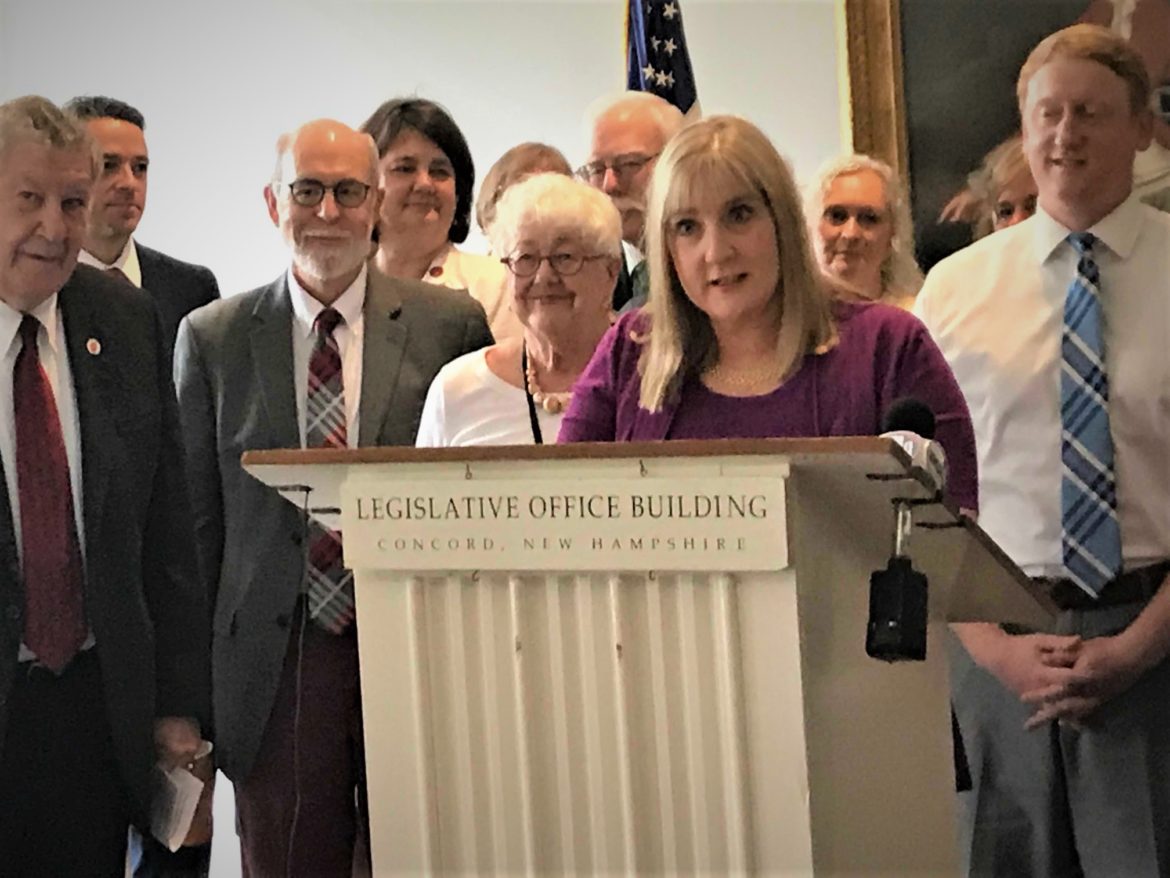By GARRY RAYNO, InDepthNH.org
CONCORD — Finding common ground on a state operating budget for the next two years is a difficult task for Democrats and Gov. Chris Sununu.
While Democratic leaders and lawmakers believe they have met the governor more than halfway, Sununu said Tuesday the legislature is knowingly sending him a budget “that I cannot support.”
The potential stalemate has lawmakers on both sides of the aisle sponsoring a continuing resolution to keep government operating if Sununu decides to veto the $13.3 billion biennial operating budget the House and Senate are expected to approve Thursday.
House Speaker Stephen Shurtleff, D-Concord, said at a press conference Tuesday, the continuing resolution will have bipartisan support and will be the first action the House takes Thursday.
At the press conference, Democrats said they have addressed nearly all of his Sununu’s concerns: removing paid family and medical leave, which he claims is an income tax, and a new capital gains tax, while agreeing to a new 24-bed forensic hospital and student debt assistance programs he championed.
“In negotiations, no one party gets everything they want,”
said Senate President Donna Soucy, D-Manchester. “We have listened to the
governor’s concerns and made concessions.”
But Sununu
says they have not listened carefully enough as he has continually said he will
not sign a budget that raises taxes, which he claims the budget does that House
and Senate budget writers negotiated last week.
“While the Legislature reluctantly removed their income tax from their budget, I have been very clear: I will not support a budget that increases taxes,” Sununu said in a statement. “I have worked with Legislative leaders and found common ground on many issues and have met them more than halfway on many of their spending requests while also proposing a path forward that does not raise taxes.”
But Senate Finance Committee Chair Sen. Lou D’Allesandro, D-Manchester, said the budget plan “stabilizes” business tax rates at last year’s level.
“That is a $90 million issue that makes this budget work,” D’Allesandro said. “The rate has been cut from 8.5 (percent) to 7.9, which is the lowest in New England.”
He called the $90 million the anchor of the budget and necessary to increase education funding to help poor communities. “You do not want to trade away a good anchor,” D’Allesandro said.

Soucy said while the governor talks about business tax rate cuts, he does not mention the business tax reforms included in the budget package that will bring the state in line with surrounding states.
“We’ve talked to businesses and the reforms mean more to them than the .2 percent reduction,” she said.
Democrats did say if Sununu does veto the budget, they remain willing to continue talking.
“We’re here to make government work,” said House Finance Committee Chair Mary Jane Wallner, D-Concord. “We will always be at the table.”
Several Democrats noted after the press conference if the budget is vetoed, then everything passed by either the House or Senate is on the table again, not just the compromise budget approved last week that removed paid family and medical leave and the capital gains tax.
Two weeks ago, after the Senate passed its recommended budget, Sununu held a press conference to outline “a road to common ground,” outlining his concerns, some that would lead to a veto, and where there was agreement.
Tuesday he said his office worked to find common ground with the Democratically controlled House and Senate on education funding, Medicaid provider rate increases, the new Secure Psychiatric Unit, upgrading Department of Transportation vehicles, $40 million in revenue sharing with municipalities, and funding for child protective and mental health services, and reducing the number of mentally ill patients in hospital emergency rooms while they wait for a bed to open at the state psychiatric hospital.
Democrats touted the same things as well as ending the wait list for developmentally disabled services, investment in the state’s workforce including additional money for the university and community college systems, lead paint remediation and fixing state-owned dams as areas of agreement.
Sununu also said the proposed budget is structurally in deficit by $93.4 million and lawmakers close that gap by using one-time surplus money.
“Households and businesses across this state are expected to balance their checkbooks each month, and so should our government,” Sununu said. “Should the economy take a downturn, the state will see a massive reduction in services and unprecedented layoffs — we cannot allow this to happen.”
But the Democrats say their budget shows a $24 million surplus at the end of the biennium while addressing the state’s most pressing needs.
“This is a compassionate, balanced budget that does so much for so many people in our state,” said Shurtleff. “More than once we reached out to the governor, but he has just not reciprocated.”
The House and Senate vote on 33 conference committee reports Thursday to finish their business for this session including the state’s two-year operating budget scheduled to go into effect July 1.
Garry Rayno may be reached at garry.rayno@yahoo.com





